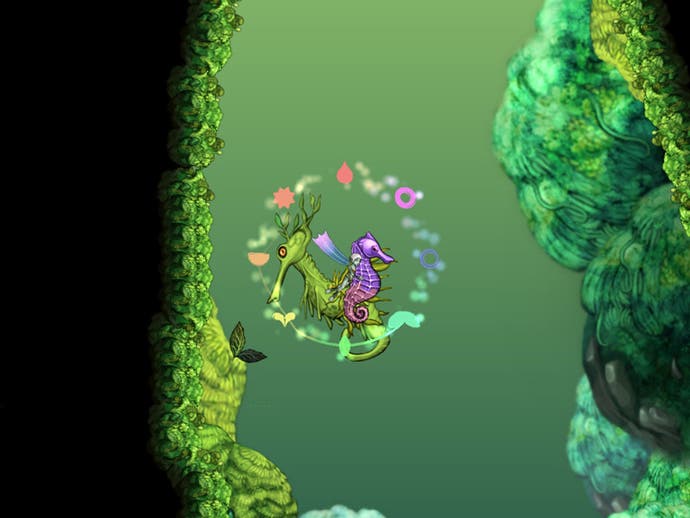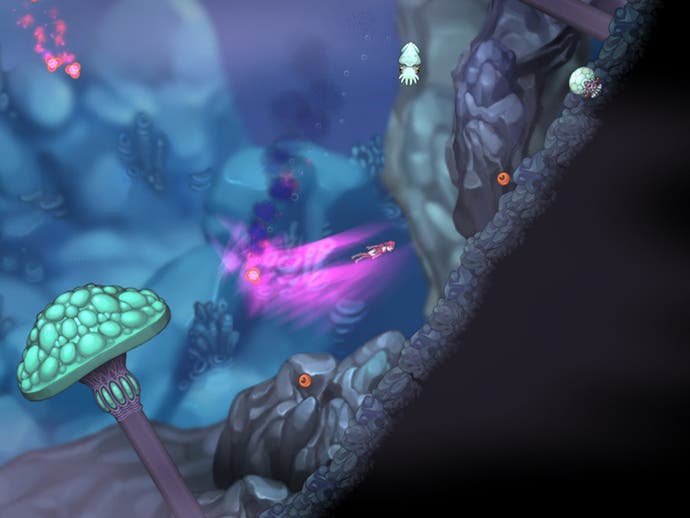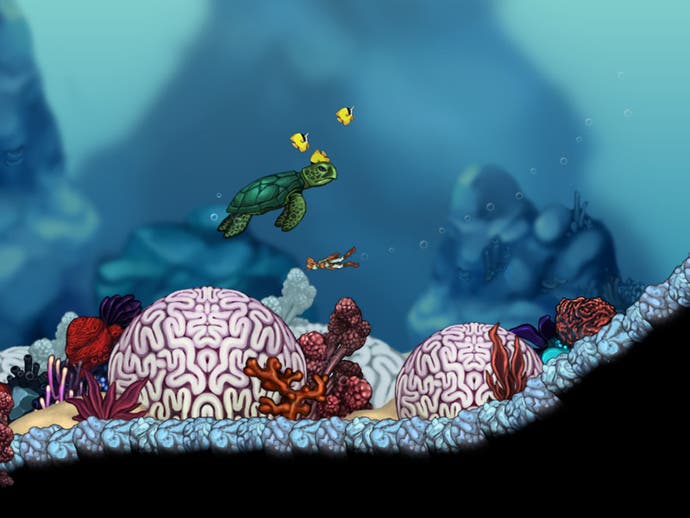Aquaria
Swimpressive.
The big winner at this year's Independent Games Festival, Aquaria is a two-dimensional underwater action-adventure that puts you in the scales of Naija, a little mercreature who suddenly wants to know about the world around her and the origin of her species, and sets out to explore.
This you help her do by clicking around the screen to move, and using a wheel of musical icons activated by holding down the right mouse button to activate special abilities. Rather than an enormous, shapeless ocean playground or a flat sea floor, Naija's world is a network of tunnels and caverns full of fearsome fish and cranky crustaceans and puzzles that the abovementioned abilities help her to overcome.
The result is something like an underwater Castlevania, with shades of a 2D space shoot-'em-up. You feel your way around a well-populated and beautifully hand-painted world until you come up against the boundaries of each area, and by applying things you've learned and acquired you're gradually able to penetrate further. You learn the rock-moving spell to unblock passages around your home; you learn to project light so you can explore an abyss; you learn to activate pearly switches so you can kill a giant underwater lion. Fish. Thing.

The shooter influence is in enemy design and your own combat techniques. Able to move freely around the huge underwater world, probing the walls and ceiling as well as the ground, attack and defence are more than a matter of jumping out of the way; you need to be deft with the mouse and mindful of the enemy's size and strength. Enemies are seldom overwhelming - only the bosses are really worrying - but going somewhere in a rush or navigating carelessly can put you in peril as tiny but spiky aquatic grumps and bottom-feeders pile into your path.
Doing all this with the mouse could have been fiddly, but it rarely is (although if you disagree then there are Xbox 360 controller and keyboard options too). The devs apparently struck upon the one-hand approach somewhat fortuitously (artist Derek Yu's dad apparently suggested it after his son left an incomplete copy of the game on his computer) but it's proven fortunate as well: you select abilities and transformations by drawing patterns between the circle of eight icons that appear when you right-click, and each one sings a different note as you hover over it, so as well as remembering sequences you remember tunes.

Aquaria's unsung strength though is in cooking. The inventory (accessed from a little icon in the bottom right of the screen) allows you to throw things you've found - meats, fins, oils, shrubs - into pans on the right and then combine them. Careful exploration uncovers recipes for new items, which range from simple healers to neat status effects, like speed boosts and even attacking buffs for the little crustacean pet you befriend near the beginning.
Whether it's simply probing to uncover more about Naija's past and people or taking a more thorough view as you seek to find all of Aquaria's secrets, like hidden costumes, there's a lot of pleasure to be had floating through the environments Yu and his partner Alec Holowka have created. The early stages feel open but are comparatively confined, as the sections beyond the (surprisingly sizable) trial version quickly demonstrate, offering countless avenues of exploration. Initially this can be overwhelming, but that sense of confusion soon dissipates once you get your head around what's happening.

Part of that will involve overcoming a flaw in the map system and an inherent frustration in the save system, but you're strong, right? The map is generally fine - once you enter an area, you can see its whole outline, secret bits and all, and they light up beige when you pass through them. But, unfortunately, areas away from your current vicinity are blacked out again until you return to them, so it can be tricky to see at a glance how much you've already covered elsewhere (particularly as the map outline of one area can look much the same as another). In a game where backtracking and keeping half-finished puzzles in mind is key, the absence of ways to easily recall this progress feels awkward, not to mention avoidable. In the aftermath of Phantom Hourglass, a system for annotating the map would have made a big difference too. Saving, meanwhile, is at least simple and logical - you go up to red crystals, subsequently marked on your map, and save - but these checkpoints are quite spread out, and there are less shortcuts between distant sections than veterans of the game's reclaimed sub-genre might expect.
When things come together though, and progress in another area is assured, there's a feeling of great excitement about swimming there and seeing what's waiting for you. Aquaria's certainly prone to leaving you disorientated, some of its puzzles are quite oblique and it's in no hurry to tell you what to do, and its mechanics lack the inventiveness of a game like Zelda, but then the fact it's two friends coding together over the Internet shouldn't be overlooked when taking note of the fact that they come surprisingly close. It's not instantly gratifying, and at USD 30 it's quite expensive for an indie game, but providing you go in knowingly then it has enough character and atmosphere bubbling through it to fill many a dreamy evening.

